Shigeki Tanaka | |
|---|---|
 Shigeki Tanaka | |
| Born | 1931 |
| Died | October 4, 2022 (aged 90–91) |
Shigeki Tanaka (田中 茂樹, Tanaka Shigeki, 1931 – October 4, 2022) was a Japanese long-distance runner who won the 1951 Boston Marathon.
Shigeki Tanaka | |
|---|---|
 Shigeki Tanaka | |
| Born | 1931 |
| Died | October 4, 2022 (aged 90–91) |
Shigeki Tanaka (田中 茂樹, Tanaka Shigeki, 1931 – October 4, 2022) was a Japanese long-distance runner who won the 1951 Boston Marathon.
Tanaka was born in 1931. [1]
Tanaka was 13 and living 20 miles from Hiroshima at the time of the 1945 Hiroshima atomic bombing. Following his Boston Marathon victory, he recalled, "We saw a bright light and heard a little noise. But no one thought anything about it at the time ... three days later, we heard the terrible news." [2]
He laid the groundwork for his career as a marathon runner by running 20 km from Shōbara to a Saijō municipal stadium as a high school student. [3] He was a first-year student at Nihon University at the time of the Boston Marathon. [4]
Japanese athletes had been barred from the 1948 Summer Olympics in London and from all major international competitions after World War II. The 1951 Boston Marathon was only the second [5] post-World War II athletic competition, after the 1951 Asian Games held a month earlier, to invite Japanese athletes. [6] [7] Tanaka was one of four Japanese runners invited to compete by Will Cloney of the Boston Athletic Association. The others were Japan's national champion Shunji Koyunagi, Yoshitaka Uchikawa, and Hiromi Haigo. [8] At the time, Tanaka was 20 years old, and weighed 118 pounds. [9] The runners stopped in Hawaii, San Francisco, and New York City en route to Boston. In each stopover they went to a movie theater and people wrapped money in paper and threw it on stage for them. Tanaka later recalled that he "felt pretty strange to receive money like that, like a beggar almost ... We bought sugar to bring back to Japan—that's how bad things were." [7]
The four were given a welcoming ceremony arranged by servicemen at the Charlestown Naval Shipyard. Because Tanaka was from Hiroshima, The Boston Globe nicknamed him "atomic boy", which he found "a burden". Tanaka later recalled that people in the United States welcomed them warmly and both Japanese and Americans cheered him during the race. [7]
Tanaka became the Boston Marathon's first Japanese winner. [4] He won the event in 2:27:45, the third-fastest time in the event's history to that point. He took the lead on Heartbreak Hill [7] and led convincingly with four miles to go. Observers expected him to break Suh Yun-bok's 1947 course record, but following his pre-race plans, Tanaka stuck to his own schedule; he did not push himself and finished comfortably. After the race, he stated through an interpreter, "I did not plan a record-breaking race, I ran only to win." [10]
Tanaka won the marathon racing in tabi-inspired split-toe running shoes made by Onitsuka, [11] which he thought would give him better traction. [12]
The three other Japanese runners in the race also did very well: Shunji Koyunagi finished in 5th place, Yoshitaka Uchikawa in 8th place, and Hiromi Haigo in 9th place. [13]
Tanaka's win inspired in Japan an enduring enthusiasm for distance running and an affection for the Boston Marathon. His win was a landmark moment in restoring the war-shattered country's dignity and honor following World War II. [7] The race and Tanaka's victory marked the beginning of a strong athletic relationship between Japan and Boston, [8] and the beginning of a tradition of Japanese victories in the race. [4]
After his running career, Tanaka worked as a salaryman for a Tokyo area department store [7] and served as a director at the Japanese Amateur Athletics Federation until his retirement. [14] Tanaka died on October 4, 2022. [15]
On May 5, 1998, Tanaka's house in Utsunomiya was ransacked and his Boston Marathon winner's medal stolen. [14] The Boston Athletic Association awarded Tanaka a replacement medal on July 10, 1998, for his achievement as the first Japanese to win the event; the association's president Frank Porter said in a message accompanying the medal that Tanaka's victory was the beginning of Japan's strength in the race. [4]
The stolen medal was recovered in a police raid on July 22, 1998. [16] A 19-year-old Brazilian of Japanese ancestry was arrested on suspicion of stealing the medal and on unrelated theft and assault charges. [17] During questioning, the suspect implicated himself in an unrelated murder and was arrested on suspicion of that crime. [18]
The two medals were subsequently displayed at the National Stadium in Tokyo. Tanaka presented the Boston Athletic Association with a "trophy of friendship" on behalf of the town of Saijō in gratitude for replacing the stolen medal. [3]

The Boston Marathon is an annual marathon race hosted by several cities and towns in greater Boston in eastern Massachusetts, United States. It is traditionally held on Patriots' Day, the third Monday of April. Begun in 1897, the event was inspired by the success of the first marathon competition in the 1896 Summer Olympics. The Boston Marathon is the world's oldest annual marathon and ranks as one of the world's best-known road racing events. It is one of six World Marathon Majors. Its course runs from Hopkinton in southern Middlesex County to Copley Square in Boston.

Joan Benoit Samuelson is an American marathon runner who was the first women's Olympic Games marathon champion, winning the gold medal at the 1984 Summer Olympics in Los Angeles. She held the fastest time for an American woman at the Chicago Marathon for 32 years after winning the race in 1985. Her time at the Boston Marathon was the fastest time by an American woman at that race for 28 years. She was inducted into the Maine Women's Hall of Fame in 2000.
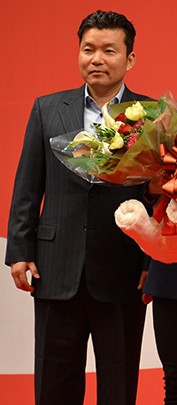
Hwang Young-cho is a former South Korean athlete, winner of the marathon race at the 1992 Summer Olympics and 1994 Asian Games.
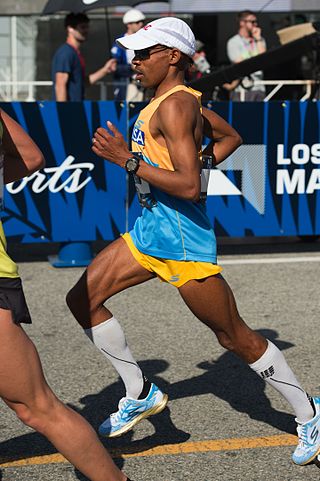
Mebrahtom "Meb" Keflezighi is a retired Eritrean-born American long distance runner. He is the 2004 Olympic silver medalist in the marathon and finished in fourth place in the 2012 Summer Olympics. He won the 2009 New York City Marathon on November 1, 2009, and the 2014 Boston Marathon on April 21, 2014, becoming the first American man to win each race since 1982 and 1983, respectively. Keflezighi is a graduate of UCLA, where he won four NCAA championships competing for the UCLA Bruins track and field team. He came in fourth in the 2014 New York City Marathon on November 2, 2014, eighth in the 2015 Boston Marathon on April 20, 2015, and second in the 2016 U.S. Olympic Team Trials to qualify for the 2016 Summer Olympics.
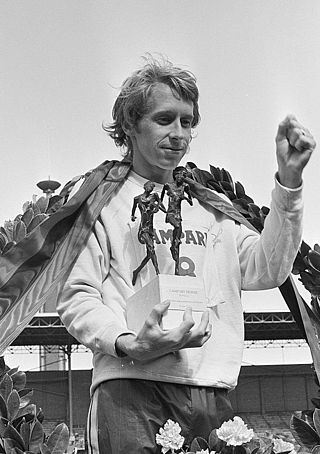
William Henry Rodgers is an American runner, Olympian, and former record holder in the marathon. Rodgers is best known for his four victories in both the Boston Marathon, including three straight from 1978 to 1980, and 4 straight wins in the New York City Marathon, between 1976 and 1979.

The men's marathon was a track & field athletics event at the 1900 Summer Olympics in Paris. It was held on July 19, 1900. 13 athletes from five nations competed in the marathon, which used a distance of 40.26 kilometres.
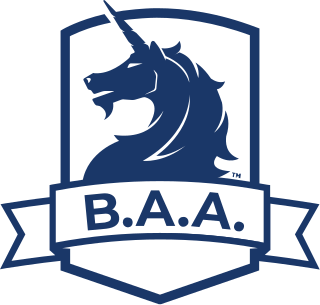
The Boston Athletic Association (B.A.A.) is a non-profit, running-focused, organized sports association for the Greater Boston area. The B.A.A. hosts such events as the Boston Marathon, the B.A.A. 5K, the B.A.A. 10K, the B.A.A. Half Marathon, the B.A.A. Distance Medley, and the B.A.A. Invitational Mile.
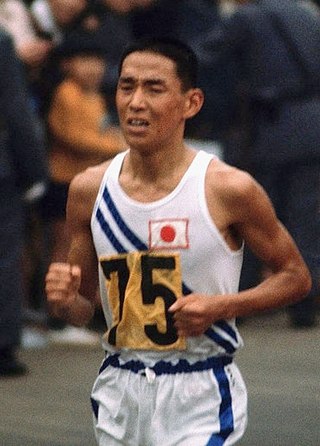
Kenji Kimihara is a retired Japanese long-distance runner. He competed in the marathon at the 1964, 1968 and 1972 Olympics and finished in eighth, second and fifth place, respectively. He won two gold medals in the marathon at the Asian Games in 1966 and 1970, and won the Boston Marathon in 1966.

Kathrine Virginia Switzer is an American marathon runner, author, and television commentator.

Yoshinori Sakai was the Olympic flame torchbearer who lit the cauldron at the 1964 Summer Olympic Games in Tokyo.

Sunita Godara is a former Indian marathon runner from Nausana. She became the national marathon champion first time in 1984 by winning Delhi Marathon She won medals in Malaysia, Thailand, India, Singapore, Philippines, Indonesia, Holland, Egypt, Japan & top 10 in many European countries & Cities- Paris, Australia, Italy, Istanbul, Turkey, the Penang 4 times and Kedah marathons. She won gold at 1992 Asian Marathon Championship held at Bandung. She competed in 1985 Boston Marathon & 1990-1991 London Marathon. She finished her College from Banasthali Vidyapith.

John Duncan Semple was a Scottish-American runner, physical therapist, trainer, and sports official. In 1967, as a race official for the Boston Marathon, he attempted to stop the 20-year-old marathon runner Kathrine Switzer from continuing to run and knocked down her coach when he tried to protect her. Switzer was officially entered in the race in accordance with the Boston Marathon's rule book, which at that time made no mention of sex. Semple subsequently claimed that amateur rules banned women racing for more than 1.5 miles (2.4 km). He subsequently oversaw implementation of qualifying times in 1970 and, in response to lobbying and rule changes by the Amateur Athletic Union (AAU), the implementation of a separate women's race in 1972.
The 2013 Boston Marathon was the 117th running of the annual marathon race in Boston, United States, which took place on April 15, 2013. Organized by the Boston Athletic Association (B.A.A.), it hosted the second of the World Marathon Majors to be held in 2013 with over 23,000 runners participating. Lelisa Desisa won the men's race with a time of 2:10:22, and Rita Jeptoo won the women's with a time of 2:26:25. Hiroyuki Yamamoto won the men's wheelchair race in 1:25:32 and Tatyana McFadden won the women's in 1:45:25.

The 2015 Boston Marathon was the 119th running of the Boston Athletic Association's mass-participation marathon. It took place on Monday, April 20. The men's race was won by Lelisa Desisa from Ethiopia in a time of 2:09:17. Caroline Rotich of Kenya won the women's race with a time 2:24:55.

Timothy Ford was an American long distance runner who won the Boston Marathon in 1906. At the age of eighteen, he is the youngest person ever to have won that race.
Marty Froelick is an American runner. In 1987, he won the Twin Cities Marathon, one of the largest races in the nation at the time. He finished with a time of 2:10:59, which remained his career-best marathon time.
Debbie Mueller is an American middle and long-distance runner who won many major road races in the 1980s and 1990s, including the Dublin Marathon.
Lei Fei is an actor, businesswoman, and a retired professional wushu taolu athlete from Macau.
Joseph Kamau is a former professional long-distance runner from Kenya who finished second in the 1997 Boston Marathon and third in the 1996 New York City Marathon.